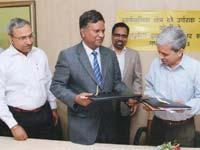India searches for potash in Canada

India’s state-run Rashtriya Chemicals and Fertilizers Ltd. (RCF) is planning to invest $1 billion in Canadian potash mines to secure long-term supply of the soil nutrient, which it says is heavily controlled by global ‘cartels’.
The Vancouver-based Western Potash Corporation, Karnalyte Resources, Allana Potash Limited and Encanto Potash Corporation are on the Indian fertiliser producer’s radar, according to India-based analysts.
Earlier this year, the Indian government declared a ‘potash import holiday’ at least until September 2012, as a move against the controls by so-called cartels backed by global potash miners.
The three ‘cartels’ are Canada’s Canpotex, which sells potash outside North America on behalf of PotashCorp of Saskatchewan, US-based Mosaic and Agrium of Canada; Belarusian Potash Company, the marketing arm of Moscow-based Uralkali and Belaruskali of Belarus; and PhosChem, which markets phosphate outside the US on behalf of Mosaic and PotashCorp.
India is the world’s second-most populous nation, and its farmers are among the biggest potash importers. India needs the key component in the fertilizer dubbed ‘pink gold’, in abundant and stable supply as it aims to achieve food security, industry analysts said.
More than half of the world’s potash reserves are in Canada, mainly in Saskatchewan.
Last week, RCF floated a tender for an independent consultant to assist its search in Canada.
“We would appoint a consultant who will identify potash mines in Canada where we can invest, maybe as a joint venture partner,” RCF chairman R. G. Rajan told media in India. The potential investment would be supported by the Indian government, he said.
According to Miningweekly.com the Indian government would assist RCF, its second-largest fertilizer producer, to acquire an equity stake in potash assets in Canada.
The government-owned RCFL would be offered support in terms of diplomatic initiatives through Indo-Canada bilateral trade talks, raising funds from international and domestic institutions and sovereign guarantees, if necessary, an official in the Department of Fertilizers said.
The Ministry of Commerce would coordinate talks with the Canadian government, targeted potash companies and RCFL to facilitate the Indian major’s acquisition plans in that country, the official said.
This decision followed talks held late last year between the Ministry of Commerce and Industry and Canada's International Trade Ministry during which it was conveyed that potash trade between the two countries should be viewed from a strategic perspective instead of that of merchant trade on commercial terms, the official added.
Negotiations on a comprehensive economic partnership agreement between India and Canada were fast-tracked and an agreement could be concluded as early as the end of this year. The free trade partnership would boost RCFL’s bid to acquire fertiliser mineral assets in that country, the official said.
Last March, The South Asian Post and its sister paper the Asian Pacific Post reported the Vancouver-based Western Potash Corporation with its proposed mine in Milestone, 35 kilometres southeast of Regina, in Saskatchewan was among the key properties India was looking at.
“Fertilizers are key to India’s economy, because nearly 60 percent of the population is dependent on farming as a livelihood,” said Western Potash chairman Patricio Varas, in an interview then.
“India cannot afford to be entirely reliant on the increasingly high prices it has to pay to Canada’s major potash producers, who operate much like OPEC with their stranglehold on supplies,” he said. “It would be of huge strategic value for India to have some direct or indirect ownership of strategic Canadian potash assets.”
Allana Potash is a Canadian publicly traded corporation which is currently developing the Dallol Potash Project, in Ethiopia.
Karnalyte Resources is engaged in the business of exploration and development of high quality agricultural and industrial potash near Wynyard, Saskatchewan.
Encanto was created to work with First Nations Peoples in Saskatchewan in order to develop potash resources on their lands. Working with the Muskowekwan, Ochapowace and Chacachas First Nations, Encanto is to explore for potash on their southeastern Saskatchewan properties.
All four companies trade on the TSE.
The global potash picture
Potash plays a central role in helping feed the world's growing population. Approximately 95% of world potash production is used as fertilizer, the rest being used in a variety of chemical and manufactured products
In 2011, Saskatchewan continued to be the world’s largest producer and exporter of potash, supplying almost 30% of the world’s supply. Saskatchewan produces over 85% of
Canadian potash production with one additional potash mine in New Brunswick.
Canada, Russia and Belarus together account for just over two thirds of global potash production.
Saskatchewan hosts almost half of world potash reserves. Potash was Canada’s leading mineral by value of mineral production in 2011 at $8.0 billion.
Saskatchewan’s current trio of potash producers PotashCorp, The Mosaic Company and Agrium separately operate 10 mines in Saskatchewan. The Mosaic Esterhazy mine complex is the world’s largest potash mine.
Leave a comment









